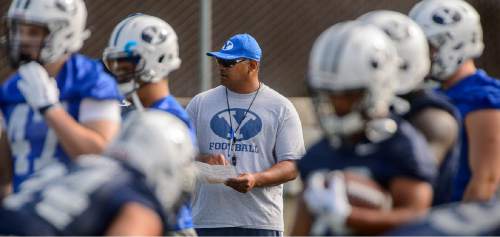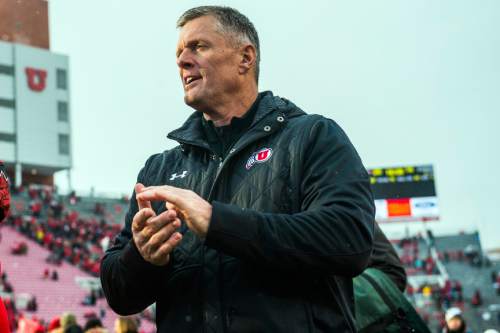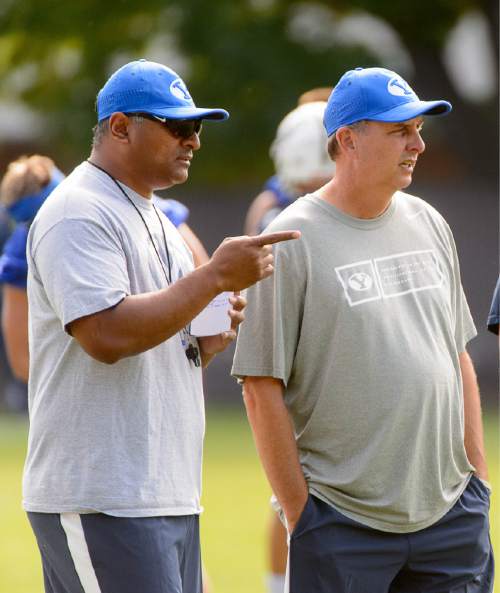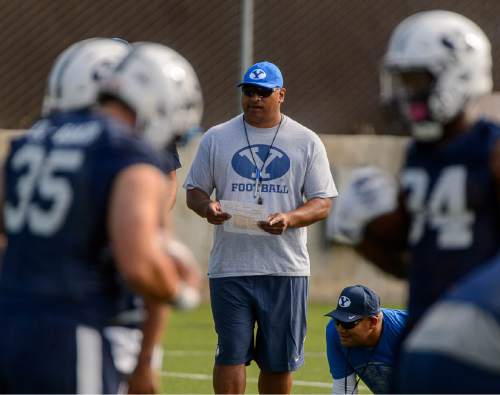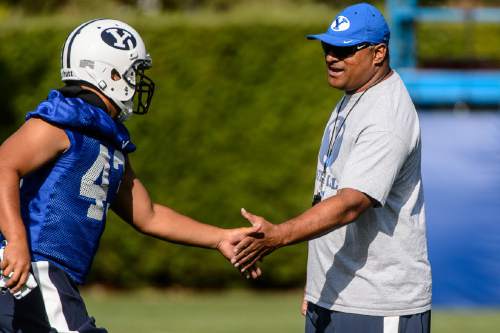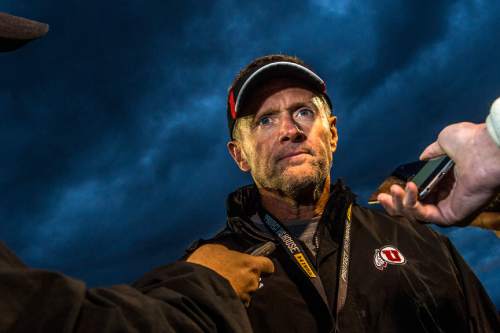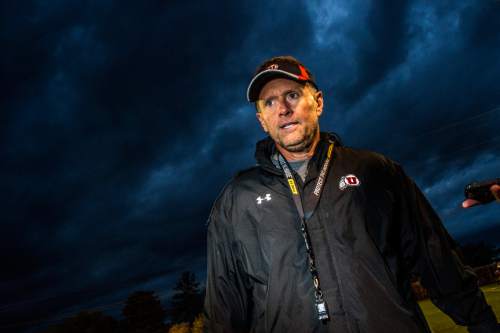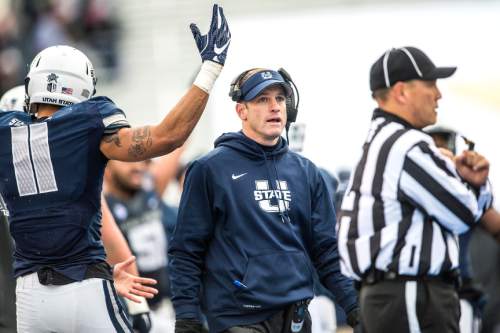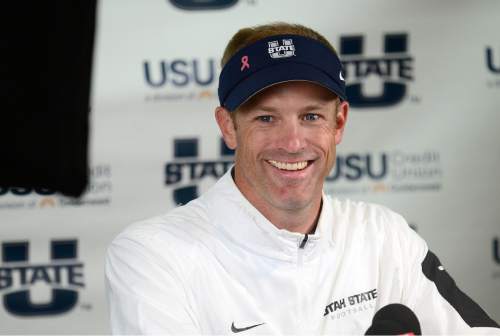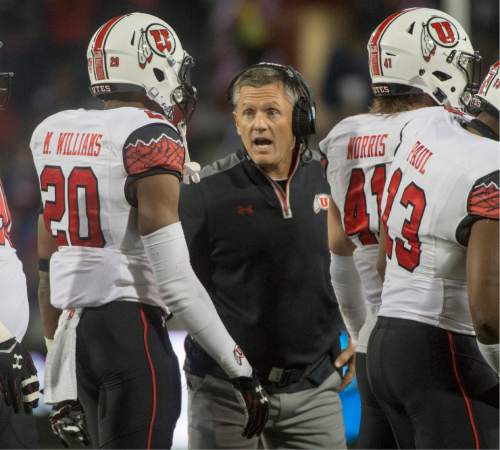This is an archived article that was published on sltrib.com in 2016, and information in the article may be outdated. It is provided only for personal research purposes and may not be reprinted.
Three schools. Three teams. Three situations. Three stages. Three coaches.
All of them different, all of them at different places in the head coaching cycle: Kyle Whittingham, Kalani Sitake, Matt Wells.
Whittingham, the dean of the bunch, has been the lead dog at Utah for 11 seasons now, going on 12. Sitake is the neophyte, entering his first season driving the boat at BYU. Wells hovers in the middle, having won 25 games over his opening three seasons, a school record for a Utah State head coach through that initial span.
Sitake, who is 40 and was born in Tonga, and Wells, born in South Carolina 43 years ago, are coaching at their alma maters. Whittingham, 56, born in California, is at his alma mater's rival. All of them now feel at home exactly where they are.
Whittingham has taken on the challenge of coaching in the Pac-12. Sitake is coaching an independent team that wishes it were in the Big 12. And Wells is attempting to make his name and stake his claim in the Mountain West.
Wells replaced the man who completely altered the direction of Utah State football — Gary Andersen. Whittingham replaced the man who bumped up the possibilities of Utah football — Urban Meyer. Sitake replaced the man who hauled BYU football out of a temporary mess and then kept it in a kind of stalled holding pattern for the better part of a decade — Bronco Mendenhall.
The veteran
Whittingham's trajectory is classic: Young coach takes over, learns some hard lessons, masters his domain, takes on a new one, and steadily builds from there.
When he emerged as Meyer's follow-up in 2005, Whittingham struggled at first, absorbing information as he went. Early on, his players wanted to strangle him because his old school ways were a bit too rigid. He got the message and started listening to them, and winning, a process that culminated in that beautifully unblemished record in 2008. Those are lessons, changes made, that have bolstered him through the transitional years from the Mountain West to the Pac-12, the last two of which have seen his teams win nine and 10 games.
"I hope I'm farther down the road, a better coach than when I first started," he says. "You're never a finished product. There's always a better way to do things. I'm still in that category and always will be. But I'm hopeful that I'm a better coach than when I first started this thing."
Whittingham says he now understands how critical it is to have a good rapport with his players. "I probably underestimated that when I first got the job," he says. "It was just, hey, let's go out and let's go. I don't care what you're thinking, how you're feeling, let's just go to work and get it done.
"But you've got to be part psychologist to do this job the right way," Whittingham adds. "And I think that's something that's definitely been impressed upon me, the second half of my tenure. My theory is, if you've got 10 guys in the room who all think the exact same way, you don't need nine of them. I like new ideas. I like coaches to defend what they believe in. The key is, when you leave the room, they all have to be on the same page. But I love to hear differing opinions. What they're thinking."
Defensive coordinator Morgan Scalley calls Whittingham a "strict and disciplined football guy, a man's man," but he says there's a flipside to him, too: "The great thing about Kyle is how humble he is. His attitude is that he and we don't have all the answers. We'll never have all the answers."
Adds quarterback Tyler Huntley: "He's a cool guy. He knows how to engage with the players. He knows how to talk to us and how to teach us."
Now, he's attempting to teach them how to win a Pac-12 title.
The rookie
Sitake, who counts Whittingham as one of his coaching mentors, having worked for him as Utah's defensive coordinator, came to BYU from Oregon State. His transition to the rather unique Cougar head coaching job has been, he says, rather seamless: "There's been nothing here that's really surprised me."
Through the first few weeks of his first fall camp as BYU's coach, Sitake says he's all right: "I love what I'm doing, the people I'm with and I'm grateful for the preparation that got me here. I thought I'd be more on edge, more ornery, but I've found myself at peace because of the players and coaches I'm with … you know, being a first-time head coach, and it's comforting. Now, all I've got to do is win."
Sitake is fully aware of that last part. With all the excitement stirred by his hiring, and the arrival of former Cougar great Ty Detmer as offensive coordinator, he knows that, regardless of the good feel currently surrounding the program, positive results are what really matter. To that end, he's warmed up the BYU environment, made it demanding but comfortable for his assistants and his players.
"I believe in what our coaches are doing and the players have all bought in," he says. "It's not all fun and games, but when you're able to be happy, be who you are, you can work hard. The guys feel comfortable, and so do I. It's all working well right now. I'm not panicked at all … but the season hasn't started, yet. I saw how Kyle and Gary [Andersen] and LaVell [Edwards] looked over everything. I'm trying to do all of that. I'm a collection of other people, borrowing from all of them. And leaning on guys like I. Tuiaki, Ty Detmer and Ed Lamb."
The man on the spot
Matt Wells is a smart, detailed coach who is now in a weird place, teetering back and forth, having made Utah State's program his, going 25-16 over his time as head coach and continuing much of the momentum from Andersen's reign. His early success — the Aggies went 9-5 and 10-4, despite numerous injuries at key positions — stirred speculation that Wells might head elsewhere. He went on to sign two contract extensions, but everyone knows what those are worth when bigger schools with bigger wallets come calling.
After signing the second one, Wells released a statement that said: "I am extremely honored to coach here at my alma mater and I'm as motivated as ever to reset the culture daily that has been established here at Utah State in our football program."
And then … last fall USU fell backward, finishing at 6-7. During this offseason, Wells lost six assistants to other programs. Although he says he feels no more pressure now than he ever has, 2016 is a significant year for him and his Aggies. With new facilities in Logan and fan expectations that have risen from the old days, he has to come through with something better. Think about it this way: What happens if USU has another sub-.500 season?
Cache Valley wouldn't be a happy place.
"I'm very happy with what our program has accomplished — the wins, the bowl wins, the player graduations," Wells says. "But there's a major sense of urgency that it's not good enough. There's a trophy still missing in our trophy case."
What Wells has learned over his first three seasons is this: he has more to learn.
"I know that every day is a new day," he says. "Every day I walk in, there's something unexpected that I had no idea about. It might have to do with football, it might be off the field, something in a kid's life. When you have 113 players and other staff members, you plan everything out and then you get thrown curveballs. I don't have all the answers. Sometimes, there are no answers. Sometimes, it's just life. I'm always looking for more knowledge, more wisdom."
In Utah, then, there's the established coach, trying to kick down the door to a Pac-12 title, the new coach, excited about his opportunity on a team without a home, and the coach trying to reestablish his position, attempting to win a league championship. All in different places, all under pressure to do what every coach must: win.
GORDON MONSON hosts "The Big Show" with Spence Checketts weekdays from 3-7 p.m. on 97.5 FM and 1280 AM The Zone. Twitter: @GordonMonson. —
The three stages of coaching
Kyle Whittingham
CAREER RECORD: 95-46
SEASON: 12th
BACKGROUND: Has led Utah through its transition from the Mountain West to the Pac-12. Four seasons of 10 or more wins, including the 2008 team that went 13-0 and finished No. 2 in the AP Top 25 poll.
Matt Wells
CAREER RECORD: 25-16
SEASON: Fourth
BACKGROUND: Former Aggies quarterback is the only coach in program history to lead his team to three bowl games, winning two of them.
Kalani Sitake
CAREER RECORD: None
SEASON: First
BACKGROUND: Named BYU's head coach in December after one year as defensive coordinator at Oregon State.


